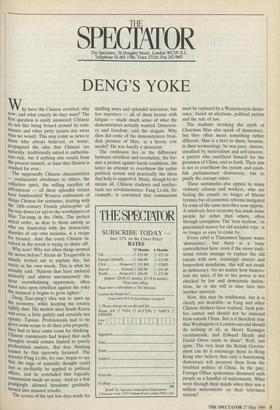SPECTAT TH} OR
The Spectator, 56 Doughty Street, London WC1N 2LL Telephone 01-405 1706; Telex 27124; Fax 242 0603
DENG'S YOKE
Why have the Chinese revolted, why now, and what exactly do they want? The first question is easily answered: Chinese do not like being bossed around by com- missars and other petty tyrants any more than we would. This may come as news to those who always believed, or worse, propagated the idea that Chinese are naturally, traditionally suited to authorita- rian rule, but if nothing else results from the present turmoil, at least that illusion is crushed for ever.
The supposedly Chinese characteristics — confucianist obedience to elders, the collective spirit, the willing sacrifice of self-interest — all these splendid virtues have bamboozled Western enthusiasts of things Chinese for centuries, starting with the 18th–century French philosophes all the way down (or up) to the worshippers of Mao Tse-tung in the 1960s. The perfect moral order, so dear to those among us who are frustrated with the democratic disorder of our own societies, is a recipe for tyranny. And this every Chinese in- volved in the revolt is trying to shake off. Why now? Why not when things seemed far worse before? Alexis de Tocqueville is usually trotted out to explain this, but rarely in his own words. This is what he actually said: `Nations that have endured patiently and almost unconsciously the Most overwhelming oppression, often burst into open rebellion against the yoke the moment it begins to grow lighter.' Deng Xiao-ping's idea was to open up the economy, while keeping the society tightly shut. His models were South Korea and even, a little guiltily and certainly not openly, Taiwan. Professionals had to be given some scope to do their jobs properly; they had to have some room for thinking. Chinese commissars had hoped that such thoughts would remain limited to purely professional matters. But free thinking cannot be that narrowly focussed. The scientist Fang Li-zhi, for one, began to say that the logic of scientific thought could Just as profitably be applied to political affairs, and he concluded that logically Communism made no sense. And so a few grudgingly allowed freedoms gradually turned into massive revolts.
The scenes of the last few days made for thrilling news and splendid television, but few reporters — all of them hoarse with fatigue — made much sense of what the demonstrators actually wanted. Democra- cy and freedom, said the slogans. Why then did some of the demonstrators bran- dish pictures of Mao, as a heroic role model? He was hardly a democrat.
The confusion lies in the difference between rebellion and revolution, the for- mer a protest against harsh conditions, the latter an attempt to overthrow the entire political system and practically the ideas that help to support it. Many, though by no means all, Chinese students and intellec- tuals, are revolutionaries. Fang Li-zhi, for example, is convinced that communism must be replaced by a Western-style demo- cracy, based on elections, political parties and the rule of law.
The students invoking the myth of Chairman Mao also speak of democracy, but they often mean something rather different. Mao is a hero to them, because, in their terminology, he was pure, sincere, unsullied by materialism and self-interest, a patriot who sacrificed himself for the greatness of China, and so forth. Their aim is not to overthrow the system and estab- lish parliamentary democracy, but to purify the corrupt rulers.
These sentiments also appeal to many ordinary citizens and workers, who are feeling the crunch, no longer of Maoist tyranny but of economic reforms instigated by some of the same men they now oppose. A relatively freer economy has made some people far richer than others, often through corruption. The `iron ricebow,' or guaranteed money for old socialiit rope, is no longer so easy to come by.
Every rebel is Tiananmen Square wants `democracy', but there is a basic contradiction here: even if the more tradi- tional rebels manage to replace the old rascals with new, seemingly sincere and benevolent mandarins, this will not result in democracy, for no matter how benevo- lent the ruler, if his or her power is not checked by law and democratic institu- tions, he or she will in time turn into another autocrat.
Now, this may be traditional, but it is clearly not desirable, as Fang and other Chinese thinkers have realised. Such poli- tics cannot and should not be imposed from outside China. But is it therefore true that Washington or London can and should do nothing at all, as Henry Kissinger recommends, and Edward Heath and David Owen seem to think? Well, not quite. The very least the British Govern- ment can do is encourage those in Hong Kong who believe that only a functioning democracy will preserve them from the troubled politics of China. In the past, Foreign Office spokesmen dismissed such people as a handful of malcontents. What went through their minds when they saw a million malcontents on their television screens?


















































 Previous page
Previous page